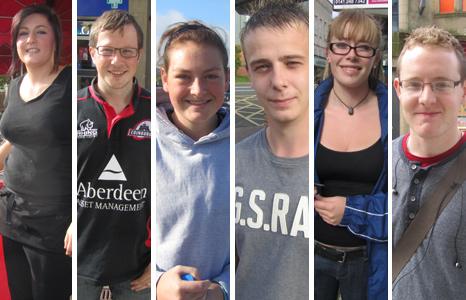You rate Google's Instant search service
- Published

[L-R] Heather, David, Morven, John, Laura and Alistair
Google is launching a new 'instant' version of its search engine.
It's a change from the current method of typing in what you're looking for, clicking on the search button, checking your results and then picking one.
Instead this will bring up results as people type.
Bosses reckon it will save people up to five seconds per search and hope it will help keep it number one ahead of other search engines like Bing and Yahoo.
It rolls out across the UK from next week.
But will it live up to the hype?
This is what people in Falkirk think
Heather McClain, 16, waitress
"You could end up getting distracted by the suggestions and read an article that you weren't even looking for. It will probably end up costing you more time than it saves you."
David Love, 25, town planner
"It sounds like a lot of fun. I'm already a bit of a Google fanatic. It will send me off on some random links that will teach me loads of stuff. Admittedly probably useless information that will only help me in pub quizzes, but still. In terms of time saved it will only save me a few seconds here and there, so it is a bit of a gimmick in that sense."
Morven Ross, 17, Sports coach
"I think it will help folk that have dyslexia. They will be able to click on the word as soon as they see it without having to worry about spelling it right. It'll save them a lot of time. The words will pop up, ready for you to click on."
John Glenn, 22, Warehouse worker
"Google's fast enough - five seconds isn't going to make that much difference, it's already fast enough."
Laura Lovet, 18, charity fundraiser
"Five seconds per search may not sound like a lot, but if I totted all those five seconds up over a week, it would give me a spare half hour to play with. I play the double bass and need to practise, so that half hour would be really handy for me."
Alistair Kerr, 23, university student
"I don't really think it's going to be that huge an efficiency saving. It's not going to revolutionise my internet searching. A better thing to do would be to improve the quality of results that pop up. Instead of just trying to predict what you're looking for."
- Published1 September 2010
